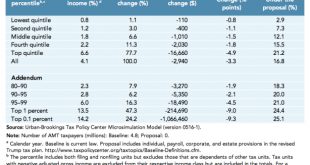from Mark Weisbrot Much of the media, and the analysts on which it relies, have provided a misleading narrative on the current political problems in Italy, following Sunday’s “no” vote on a referendum on constitutional changes. It has been lumped together with Trump, Brexit, the upsurge of extreme right-wing, anti-European or racist political parties and “populism,” ― which in much of the media seems to be code for demagogic politicians persuading ignorant masses to vote for stupid...
Read More »Carrier capitalism (or rule and law based vs. deal based capitalism)
from David Ruccio President-elect Donald Trump’s decision to bribe Carrier into keeping 800 manufacturing jobs in Indiana, instead of moving them to one of its Mexican plants, has met with opposition from mainstream economists, both liberal and conservative. Clearly, it’s not about the size of the deal (although $7 million in incentives to keep less than one thousand jobs is a big deal). Carrier corporate parent United Technologies is still planning to outsource production that will...
Read More »The deterioration of social capital
One of the most idiosyncratic developments of the last decades is the rise of mortality of white middle aged USA citizens (graph). According to Anna Case and Angus Deaton this was closely related to abuse of alcohol and opioids. (see graph). The 2015 data are just in: this trend continued (and black men joined it). People were somehow aware of this: the larger the deterioration in health, the larger the swing towards Trump during the recent USA elections (the best postdictor of the...
Read More »Why Trump Won?
“the surge in inequality and the stagnation of wages” from Peter Radford I listened last night to Matt Dickinson from Middlebury college give a talk about the recent election. This is my synopsis: The election did not represent much of a change in voter patterns. Trump’s victory was based more on a tweak rather than a reconstruction of the voting patterns of the 2012 election. So this was not a revolutionary moment, marking, instead, a logical further step in a longer term trend. That...
Read More »A crisis-prone & fragile financial system
from Asad Zaman Prior to the Global Financial Crisis (GFC 2007), many senior economists and policy makers expressed confidence that they had finally solved the problem of business cycles, booms and busts, that plagues capitalism. Because of this over-confidence, early warnings of a looming crisis by Nouriel Roubini, Ann Pettifor, Peter Schiff, Steven Keen, Dean Baker, and Raghuram Rajan, were ridiculed and dismissed. Even after the crisis, many economists thought this was a minor glitch,...
Read More »Class and Trumponomics
from David Ruccio President-elect Donald Trump has inherited an economy that is as divided as the electorate. The question is, what will that economy look like if and when Trump’s right-wing national-populist promises and post-election proposals are enacted? As I have shown in the three installments of the first part of this series, “Class Before Trumponomics” (here, here, and here), over the course of recent decades and continuing through the crash and recovery, the class nature of the...
Read More »Donald Trump and the Republicans: The art of the steal
from Dean Baker During the campaign Donald Trump boasted that he could kill someone on Fifth Avenue and it wouldn’t affect his standing among his supporters. Whether or not this is true, this appears to be the approach that Trump and his fellow Republicans are taking to their role in governing. The basic story is that they can rip off the public as much as they want, because ain’t no one going to stop them. They could be right. The most immediate issue is Trump’s refusal to sell his...
Read More »Uncertain media future
from C. P. Chandrasekhar In today’s troubled times, mega-mergers are the norm. Announcements of marriages like that between AB Inbev and SABMiller in the beer industry or Bayer and Monsanto in the agribusiness sector attract attention that soon fades, even as the difficult task of getting clearances from the regulators continues. But the just announced agreement to merge by AT&T and Time Warner, in a $85 billion deal, is likely to remain in public discussion for some time. If it does...
Read More Ȇber rich got richer
from David Ruccio The total income reported on the top 400 individual tax returns rose 20 percent in 2014, according to Internal Revenue Service (pdf) data released last Thursday. The figures reveal the concentration of earnings at the summit of the income distribution, in a club that required $126.8 million of adjusted gross income to enter. That tiny group, out of nearly 150 million tax returns in 2014, took home $175.5 million on average (that’s in 1990 dollars) and 1.3 percent of...
Read More »P5:Intellectual & Theoretical Context
from Asad Zaman Fifth Post in a sequence on Re-Reading Keynes. Chapter 1 of General Theory is just one paragraph, displayed in full HERE Briefly: Keynes writes that Classical Economics is a special case of his General Theory. Furthermore, the assumptions required for the special case do not hold for contemporary economic societies,”with the result that its teaching is misleading and disastrous if we attempt to apply it to the facts of experience” The discussion below borrows...
Read More » Real-World Economics Review
Real-World Economics Review




